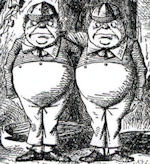 Contrariness is not a trait we’re encouraged to develop while growing up. Those who are habitually contrary tend to standout. As a kid, you’re called precocious (or bratty); as an adult, you’re called unemployed.
Contrariness is not a trait we’re encouraged to develop while growing up. Those who are habitually contrary tend to standout. As a kid, you’re called precocious (or bratty); as an adult, you’re called unemployed.
It’s too bad because so much can be discovered in turning claims, ideas, and opinions on their head and looking at them with fresh eyes. This is what critical and creative thinking is really about.
In his book Impro, Keith Johnstone, a renowned drama teacher, describes how he came to have a contrary outlook:
At about the age of nine I decided never to believe anything because it was convenient. I began reversing every statement to see if the opposite was also true… As soon as you put a ‘not’ into an assertion, a whole range of other possibilities opens out.
I like this idea. It opens up other points of view, even if it doesn’t change your mind. For example, consider the sage advise: Regular exercise is essential to good health.
Now reverse it: Regular exercise is not essential to good health. Can that possibly be true? (Please let me know because I’m looking for as many excuses as I can get.)
Being contrary, at least to yourself, is about questioning what you hear, what you read, and what you assume. And if it makes your head hurt to try this, you’re doing it right.
As Tweedledum says in Through the Looking Glass, “I know what you’re thinking about, but it isn’t so, nohow.” I like to keep that quote above my desk to remind me.
It’s good to consider the opposite. Or contrariwise, it’s not good. What do you think?